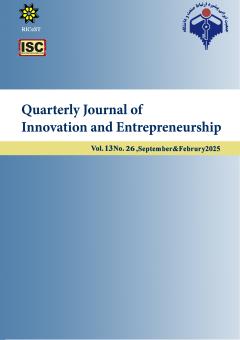For the New Value Creation of Regional (Economic-Political) Diplomacy of The Islamic Republic of Iran In Eurasia (Membership, Goals, Opportunities, Challenges
Subject Areas : تخصصی
mohsen jamshidi
1
*
![]() ,
ahmad shohani
2
,
ahmad shohani
2
![]()
1 - Political researcher and PhD in political science (Iranian issues), Kermanshah Branch, Islamic Azad University, Kermanshah, Iran
2 - Assistant professor and member of the academic staff of the Department of Political Science, Payam Noor University, Tehran, Iran
Keywords: Central Asia, Eurasian Economic Union, Shanghai, Iran's membership, Regional Integration.,
Abstract :
Central Asia (Eurasia) is one of the geostrategic regions in the world that has a good and suitable capacity to improve the economic level of the countries in the region. Despite its membership, can Iran's foreign policy make the best use of these capacities in line with its national interests (issue). What are the goals and achievements of Iran's membership in more regional agreements? The aforementioned political-economic regional agreements are more economic than political. These goals have not been fully achieved so far, because Iran's power and axis of influence in this region is much less than the other two powers (China and Russia). In some cases, the conflict of interests can also be seen (question, hypothesis). The above research is of an applied type and has been analyzed and compiled with a qualitative-interpretive method and a descriptive-analytical approach (type, method). The findings of the research show that the opposition to the global hegemon in the Eurasian region and the cooperation of countries such as Russia, China and Iran in this direction have a significant impact on global equations and at the same time push the unipolar-multipolar system towards multilateralism. Also, the structure and goals of the aforementioned organizations and Iran's membership in them, with the predominance of security-political events, also have economic-political dimensions, which, if understood correctly, create opportunities for Iran in the economic, political, security and commercial fields. be (findings)
منابع :
- Alipour Gurji, Mahmoud and Saifi, Abdul Majid and Rozbahani, Mohhaddeh (2020), the position of the Islamic Republic of Iran in Russia's soft balancing against America, Political and International Research Quarterly, Spring, No 42. ( in Persian).
- Business Research Institute (2021), examining the economic and commercial dimensions of the Shanghai Cooperation Organization and the opportunities facing Iran, January. ( in Persian)
- Dehshiri, Mohammad Reza and Rezaei Jafari, Mohsen (2014), Neo-regionalism in Iran's foreign policy, World Politics Quarterly, Summer, Third Term, Number 2. ( in Persian).
- Doraj, Hamid and Falahat Pisheh, Heshmatullah (2019), the alignment of Iran, Russia and China against America in the geopolitical page of Eurasia, Journal of Political Geography Research, spring, year 4, issue 1, serial 13. ( in Persian).
- Farsaei, Shahram and Ghasemi, Hakim and Nawazani, Bahram (2019), Economic Opportunities of the Islamic Republic of Iran in Convergence or Eurasian Economic Union, Central Asia and Caucasus Quarterly, Winter, No. 108. ( in Persian).
- Jamshidi, Mohsen and Kabiri, Zohreh (1401), limitations of the development of structural (political-economic) relations between Iran and China in the last decade, Political Strategy Quarterly, Winter, Year 6, Number 4, Number 23. ( in Persian).
- Hamiani, Masoud and Sajjad Pour, Seyyed Mohammad Kazem (2022), Geopolitics and Eurasian Identity: Iran and the Shanghai Cooperation Organization, Central Asia and Caucasus Studies Quarterly, Spring, 28th year, number 117. ( in Persian).
- Iran Chamber Research Center (2023), Iran's membership in BRICS, Tir. ( in Persian)
- Lengacher, Jakob. 2018. the shanghai cooperation organization energy club a collaborative future for nuclear energy, May. ( in Persian).
- Nejati, Mehdi and Balaghi Inalo, Yaser (2022), Analysis of the benefits of Iran's membership in the Shanghai Cooperation Organization: a calculable public interaction approach, Economic Research Quarterly (Sustainable Growth and Development), Fall, Year 22, Number 3. ( in Persian).
- Razini, Ebrahim Ali and Shahani, Faiqeh and Wadjani Tehrani, Hedah (2013), Investigating the trade potential between Iran and the member countries of the Shanghai Cooperation Organization (SCO) using the gravity model, Business Research Quarterly, Winter, No. 69. ( in Persian).
- Rezaei, Masoud and Voshoqi, Saeed (2016), dimensions and limitations of military relations between Iran and China after JCPOA, Political and International Approaches Quarterly, Spring, 7th year, number 45. ( in Persian).
- Rezaei, Alireza (2021), the desired foreign policy of Ebrahim Raisi government, the model of justice-oriented order based on the soft balance strategy, Political Strategy Quarterly, Summer, Year 5, Number 2, 17 in a row. ( in Persian).
- Russian Union of Industrialists and Entrepreneurs. 2021. The SCO Business Council. November 7. https://en.rspp.ru/ activity/cooperation/the-sco-business- council.
- Xueqing, Jiang. 2021. SCO Interbank Consortium unveils roadmap for future growth. September18.
- http://www.chinadaily.com.cn/a/202109/18/WS6145793fa310cdd39bc6a361.html.
-https://chinahandsmagazine.org/2018/05/30/the-shanghai-cooperation-organization-energy-club-a-collaborative-future-for-nuclear-energy.

